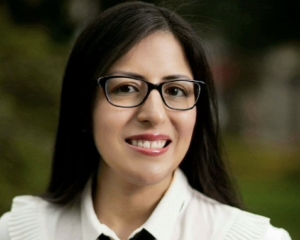Fabiola Torres

ICFJ Knight Fellow Fabiola Torres spearheads a project that deepens news coverage of health, corruption and governance across Latin America. She steers cross-border teams of journalists who fight misinformation, expose wrongdoing and produce investigative stories that consistently lead to improvements in policies and people’s lives.
A year before COVID-19 struck, Torres created the health reporting platform Salud con Lupa (“health under a magnifying glass”), the region’s first news site devoted exclusively to health reporting.
When it struck in early 2020, Torres built a corps of journalists in 10 countries to produce investigative, data-driven, multimedia news stories around the pandemic. They reported in depth on the swath of disease and destruction that hit the region, and they revealed corruption that marred efforts to purchase medical supplies and protective gear for health workers and the public.
The project has lead to major impacts:
- In Peru, 40 government officials , including the country's Minister of Health, resigned their posts after Salud con Lupa reported that more than 400 individuals -- people of power and influence -- were secretly given COVID-19 vaccinations.
- In an earlier case, the Peruvian health minister announced the withdrawal of hydroxychloroquine as a drug treatment for COVID-19 after a series produced by Salud con Lupa in collaboration with scientists revealed that the drug was ineffective and risky in treating the disease.
- In Argentina, the city of Buenos Aires launched an investigation of its spending practices after a Salud con Lupa story showed that the city wasted $2.4 million buying masks that were never delivered.
- In El Salvador, President Nayib Bukele fired the director of the country’s Environmental Fund after Salud con Lupa broke the story that the official sold the government 100,000 face shields at inflated prices, in violation of the rule prohibiting him from receiving state contracts.
- In Colombia, a funeral company lost a large government contract to perform cremations of COVID-19 victims after a Salud con Lupa investigation revealed that it had violated environmental regulations by improperly disposing of demolition and construction materials.
The Salud con Lupa website also features special sections that address critical issues:
Debunking Health Misinformation
The Comprueba (or Check) section of the platform dispels rumors and spreads accurate information about health matters. It addresses questions ranging from unproven treatments for COVID-19 such as malaria medicines and vitamin supplements to the safety of air travel during the pandemic.
Curating Fact-Checks for easier access
In 2021, with additional support from the Poynter Institute, Torres is launching the Lupa Colectiva project, a virtual dashboard where viewers will be able to follow topics being fact-checked by Salud con Lupa’s journalists in collaboration with scientists from the Epistemonikos Foundation (https://saludconlupa.com/comprueba/).
Examining important topics in depth, including:
- Indigenous groups: “The Other Latin America” is a two-part series that explores the challenges indigenous communities in Bolivia, Chile, Ecuador, Guatemala, and Venezuela face as a result of the pandemic.
- Mental Health: “When Reality Broke” is a news series where journalists from six countries uncover the impact of COVID-19 on mental health in Latin America. They analyze the emotional burden on medics, emotional consequences on school children from virtual classes, the increase in severe depression amongst men, and much more.
- Human costs of the pandemic: “In Memoriam” commemorates the lives lost to COVID-19 through obituaries and short audios from family and friends.
- Gender issues: “Our lives” is a micro-site that covers gender topics such as discrimination, violence, the wage gap, women’s mental health and maternal health.
Torres is a co-founder and editor of OjoPublico, an independent, nonprofit Peruvian newsroom known internationally for its award-winning investigative journalism.
Early in her Knight fellowship, she worked with a variety of Latin American media partners that range from burgeoning digital startups to legacy media to the transnational CONNECTAS Hub, a network of some 200 journalists in 15 Latin American countries.

